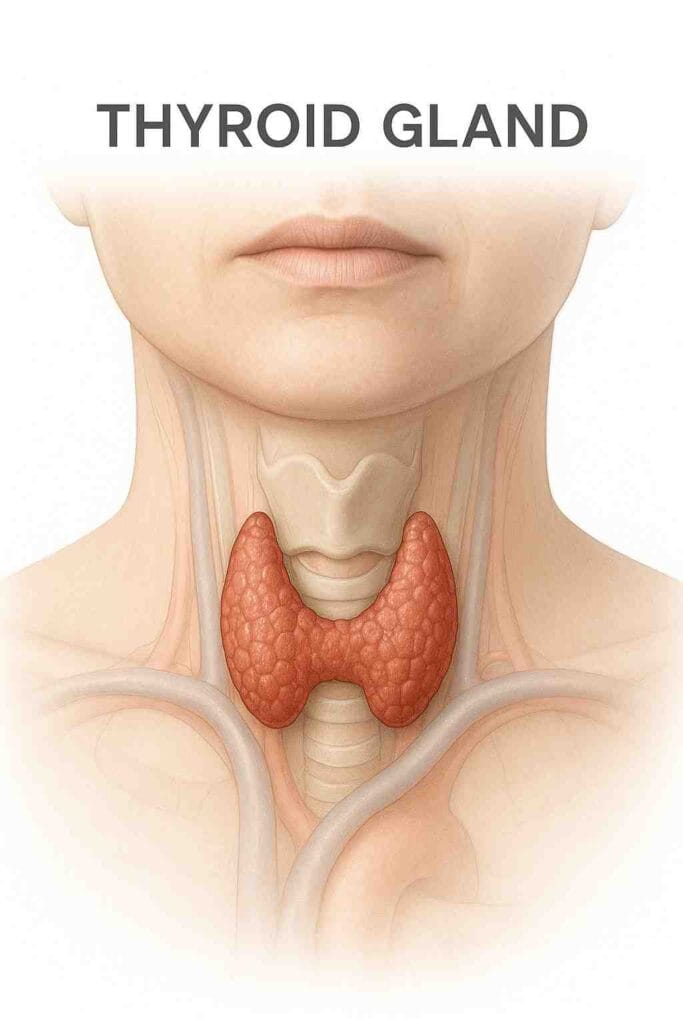
Introduction
Certain health problems present themselves with sudden pain or dramatic changes. The rest enter softly and find a place in daily life. Thyroid problems in women mostly fall into this silent category.
A lot of women confuse these symptoms with menopause or the process of aging. When you leave them unattended, the problem may worsen with time. This guide explores how to recognize subtle hypothyroidism symptoms, their difference from menopause, and how to act with evidence-based research.
Quick Overview: Early Signs & Symptoms of Thyroid Problems in Women
- Constant tiredness
- Feeling unusually cold (cold intolerance, hypothyroidism)
- Brain fog or difficulties with concentration (brain fog thyroid)
- Gaining weight unknown to any lifestyle change
Other common symptoms:
- Dry skin
- Thinning hair (hair loss thyroid problem)
- Irregular periods or heavy periods
Research Evidence: The first symptoms of hypothyroidism in women include well-documented fatigue, cold intolerance, weight gain, and irregular periods[1].
Why Thyroid Problems Often Go Undetected
The thyroid gland, situated in the neck, helps to keep the body in line by creating the thyroid hormones that regulate metabolism, body temperature, mood, and energy.
When it produces insufficient thyroxine (T4) and triiodothyronine (T3), then the body slows down, a condition called hypothyroidism.
Why is it commonly confused with menopause?
- Similar symptoms: Fatigue, mood changes, weight gain, irregular periods
- Different causes: Menopause results from reduced estrogen & progesterone, while hypothyroidism is due to low thyroid hormone levels
Scenario: A woman at the age of 48 years who experiences brain fog and heavy menstrual periods might believe that she is going through menopause. High TSH and low free T4 can be detected by blood tests that can verify the presence of hypothyroidism [2].
Subtle Thyroid Symptoms to Watch For

1. Feeling Cold Persistence- Low thyroid hormone in the body slows down the body, and it becomes difficult to keep warm. In case you require a sweater despite good weather, it could be more than just the weather.
2. Brain Fog and Memory Struggles- Mental activity and memory may be retarded by hypothyroidism. This can cause the loss of memory or concentration [3].
3. Unexpected Weight Gain- A reduced metabolism may lead to a gradual increase in weight despite any dietary changes, usually 2–5 kg on average [4].
4. Dry Skin and Hair Thinning-Reduced skin regeneration and slower hair follicle activity can cause dryness and hair loss.
5. Irregular or Heavy Periods- Thyroid hormones interact with reproductive hormones, which may result in affecting cycle length and flow [5].
Difference Between Thyroid Problems and Menopause
A TSH test for women with free T4 measurement is the most accurate way to confirm thyroid function.
- Menopause clues: Hot flashes, night sweats (rare in thyroid disease)
- Thyroid clues: Cold intolerance, neck swelling (goiter), symptoms possible at any age
Thyroid vs. Menopause: Quick Comparison
| Symptom | Thyroid Problem | Menopause |
| Feeling cold often | ✅ Common | ❌ Rare |
| Brain fog & poor memory | ✅ Common | ✅ Common |
| Weight gain | ✅ Without diet change | ✅ Possible |
| Dry skin & hair loss | ✅ Common | ✅ Possible |
| Irregular/heavy periods | ✅ Common | ✅ Common |
| Hot flashes/night sweats | ❌ Rare | ✅ Very common |
| Age of onset | Any age | Usually 45–55 |
Treatment and Support
Primary Treatment for Hypothyroidism
Daily levothyroxine can normalize hormone levels and typically relieves the symptoms within weeks [6].
Lifestyle Support for Thyroid Health
- Selenium (Brazil nuts, fish) — aids metabolism of thyroid hormone
- Iodine (seafood, dairy) — essential for hormone production
- Zinc (meat, legumes) — aids hormone production
- Vitamin D (eggs, sunlight) — supports immune and endocrine well-being
- Stress management — Autoimmune flare-ups may be managed with yoga, walking, and mindfulness [7].
Real-Life Example
Maria, aged 42, experienced constant fatigue and reported hair thinning. She blamed stress. Tests revealed high TSH and low free T4 — classic hypothyroidism. She bounced back after beginning levothyroxine, with hair shedding decreasing and regaining energy.
Conclusion
Thyroid problems can be silent but serious. Knowing the signs and symptoms, getting tested at an early stage, and initiating proper treatment may protect your long-term health. A simple TSH test can be a life-changer.
FAQs
Q1. Can thyroid symptoms come and go?
Yes. They can be occasional in early stages, but tend to be progressive in case they are not treated.
Q2. Is it possible to fix my thyroid naturally without medicine?
Diet and lifestyle are helpful, but most cases need medication.
Q3. How often should I check my thyroid?
Every 1–2 years if you have symptoms or family history, or changes sooner.
Q4. Can stress cause thyroid disease?
It is not the direct result of stress, but stress may trigger autoimmune thyroiditis.
Clear and informative breakdown of thyroid symptoms in women — very helpful for raising awareness and encouraging early consultation:
https://amandeephospital.org/blog/What-Are-The-Symptoms-Of-Thyroid-Problems-In-Women